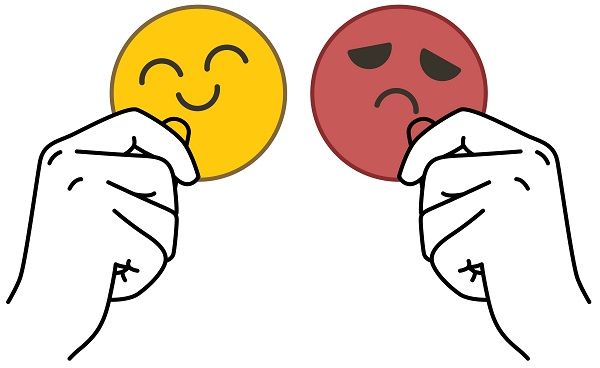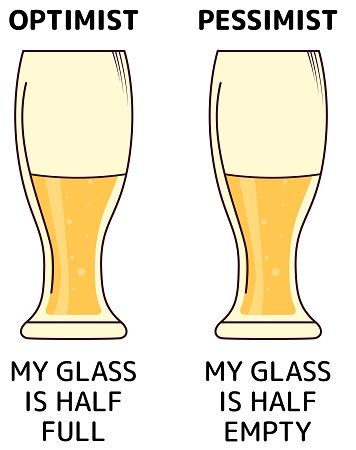 We all know that the actions of people are greatly affected by their beliefs about positive or negative outcomes. Optimism and Pessimism are two states of mind or belief that are contrasting in nature. This state of mind can regulate a person’s behaviour and actions.
We all know that the actions of people are greatly affected by their beliefs about positive or negative outcomes. Optimism and Pessimism are two states of mind or belief that are contrasting in nature. This state of mind can regulate a person’s behaviour and actions.
In optimism, we tend to see the bright side of any situation and hope that things will work out in our favour. Conversely, in pessimism, we focus more on our problems rather than finding solutions; we become more complaining and make the problem look bigger than it really is.
While optimists have future plans, they dream big and try to achieve them. Contrary to this, pessimists are the people who keep brooding their past and have no plans for the future.
Content: Optimism Vs Pessimism
Comparison Chart
| Basis for Comparison | Optimism | Pessimism |
|---|---|---|
| Meaning | A state where a person has a positive approach towards life, hoping for the best possible result of any given situation. | A state in which a person has a negative approach towards life, expecting the worst outcome from any given situation. |
| Perception of life | Colourful and Interesting | Dull, meaningless and boring |
| Brings | Confidence | Insecurity, uncertainty and hesitation |
| Focus | What is in our hands? | What is not in our hands? |
| Mindset | Growth | Fixed |
| Challenges | Opportunity | Hurdles |
| Obstacles | Something that makes them wiser and stronger. | Something that increases their miseries and helplessness. |
What is Optimism?
Optimism is a mood or attitude in which people often have a favourable outlook regarding events or situations. Simply put, optimism is a habit of expecting the best out of any situation. It is a belief that the result of any endeavour will be favourable.
Optimism can be situation specific, or it can be the basic nature or part of someone’s personality. It is a socially valued trait, and due to this, optimistic people are well-liked by others, and their social connections are also large. Moreover, it is a virtue which people possess to differential degrees. It determines how people look at and respond to different situations.
Optimism is related to a number of positive outcomes, like physical health, professional well-being and psychological functioning.
Characteristics of Optimistic Person
- Higher levels of extraversion and self-esteem
- Lower levels of neuroticism, stress, hopelessness and anxiety
- Lower levels of depression and mood disturbances
- Fewer negative interpersonal interactions
Do you know?
Studies have shown that individuals differ on the grounds of optimism. This means that some people are more highly inclined than others, as they expect positive things throughout the variety of life.
Further, studies have also shown that people with an optimistic approach are better liked by others and are socially rejected less often. They have long-lasting relationships with people.
Signs of an Optimistic Person
- They expect things will work out as planned.
- Embracing challenges as opportunities and failures as lessons.
- Always grateful for the things they have in their life.
- Having a positive and hopeful attitude all the time.
- Not letting anything negative ruin their day.
Benefits of Optimism
- Increases life expectancy
- Improves immunity system
- Improves productivity and resilience
- Prevents chronic diseases
- Increases success in whatever you do.
- Enables better coping strategies when experiencing adversity.
Also Read: Difference Between Knowledge and Wisdom
What is Pessimism?
Pessimism is a state in which the person has a negative outlook towards events or conditions. One can be pessimistic about a particular situation, or he can be pessimistic by nature, or it can be a part of his personality. Pessimists often argue about their pessimistic behaviour as a realistic approach.
It is an attitude or a trait wherein a person focuses and talks more about their adversities and misfortunes. Pessimists are the people who believe that the situations will turn out badly and have a cautious approach towards the world. They believe that bad prevails over good.
It is a negative mental attitude wherein an unfavourable outcome is expected from a given situation.
Characteristics of Pessimist
- Lower levels of extraversion and self-esteem
- Higher levels of neuroticism, stress, hopelessness and anxiety
- Higher levels of depression and mood disturbances
- Greater negative interpersonal interactions
Signs of Pessimism
- Anticipating the worst in any situation
- Pessimists have gloomy or sceptical outlook.
- Showing surprise when something good happens to them.
- Getting annoyed with optimistic people
- They do not explore things because they believe that they always fail and nothing good happens to them.
- Believing that they are not worthy of anything or they are not deserving.
- Holding bad views about yourself and your skills.
- They undervalue their abilities.
- Thinking that good and enjoyable things will come to an end.
Also Read: Difference Between Positive and Negative Reinforcement
Key Differences Between Optimism and Pessimism
- Optimism is a cognitive expectancy for favourable or good outcomes or events to happen in the future. Conversely, Pessimism indicates expectancy for unfavourable and bad outcomes to occur in future.
- Optimistic people perceive that failure occurs due to the lack of hard work, so they will put more effort into succeeding next time. In contrast, pessimistic people often burden themselves with blame.
- Optimistic people expect good and favourable outcomes in the situation; they are likely to experience a positive mix of feelings. In contrast, pessimistic people have a negative approach towards life, so they always expect negative or unfavourable outcomes. Hence, they are likely to experience negative feelings. These feelings can be disappointments, sadness, depression, stress, anxiety and so forth.
- Those who are optimistic exert effort, but the ones who are pessimistic disengage from efforts.
- People with optimistic attitudes look at the bright side of any situation. At the same time, people with pessimistic attitudes look at the dark side of any situation. Example:

- Optimistic people are more likely to come from those families where parents and other family members use hopeful and cheerful explanatory styles. On the contrary, pessimistic people are more likely to come from those families where parents are complaining, ungrateful, use self-criticism, are often depressed and use negative and demoralized explanatory style.
- Optimists have a growth mindset. They believe that hard work and dedication can develop intelligence and abilities. As against, pessimists have a fixed mindset. Pessimists are of the opinion that intelligence and abilities are static and there is no room for further improvement.
Conclusion
Above all, the concepts of optimism and pessimism have an impact on human expectations for the future. The way an optimist and pessimists address problems differ greatly. Optimists take problems as a way to improve their abilities and learning. In contrast, pessimists see problems as difficulties and obstacles.






Sandra Utria says
The article on pessimism and optimism was good. I enjoyed it greatly.